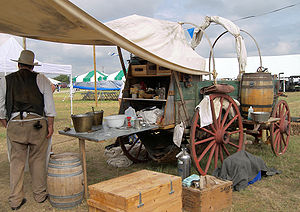- Chuckwagon
-
A chuckwagon or chuck wagon is a type of wagon historically used to carry food and cooking equipment on the prairies of the United States and Canada.[1] Such wagons would form part of a wagon train of settlers or feed traveling workers such as cowboys or loggers.
In modern times, chuckwagons feature in certain cooking competitions and events. Chuckwagons are also used in a type of horse racing known as chuckwagon racing.
Contents
History
While some form of mobile kitchens had existed for generations, the invention of the chuckwagon is attributed to Charles Goodnight, a Texas rancher who introduced the concept in 1866. Goodnight modified the Studebaker wagon, a durable army-surplus wagon, to suit the needs of cowboys driving cattle from Texas to sell in New Mexico. He added a "chuck box" to the back of the wagon with drawers and shelves for storage space and a hinged lid to provide a flat cooking surface. A water barrel was also attached to the wagon and canvas was hung underneath to carry firewood. A wagon box was used to store cooking supplies and cowboys' personal items.[2]
Chuckwagon food typically included easy-to-preserve items like beans and salted meats, coffee, and sourdough biscuits. Food would also be gathered en route. On cattle drives, it was common for the "cookie" who ran the wagon to be second in authority only to the "trailboss". The cookie would often act as cook, barber, dentist, and banker.[3]
The term "chuck wagon" comes from "chuck", a slang term for food, and not from the nickname for "Charles".[4]
Cook-offs
 Charles Goodnight's chuckwagon was named in 2003 as the "official state vehicle" of Texas; this exhibit is at the Texas Cowboy Hall of Fame in the Fort Worth Stockyards in Fort Worth.
Charles Goodnight's chuckwagon was named in 2003 as the "official state vehicle" of Texas; this exhibit is at the Texas Cowboy Hall of Fame in the Fort Worth Stockyards in Fort Worth.
The American Chuckwagon Association is an organization dedicated to the preservation of the heritage of the chuckwagon. Its members participate in chuckwagon cook-offs throughout much of the US. Through these events, the members educate the public on the history and traditions surrounding the chuckwagon.
At a chuckwagon cook off, each wagon is judged on the authenticity of the wagon. Wagons must be in sound drivable condition, with equipment and construction available in the late 1800s. Contents of the chuck-box, including utensils, must also match what would have been used during the era. Wagons are also judged on the attire of their cooks. A typical chuckwagon cookoff is composed of 5 food categories: Meat (usually chicken-fried steak), Beans (pinto), Bread (sourdough or yeast), Dessert (usually peach cobbler), and potatoes. A team of judges evaluates the entries from each wagon, giving each a score. Once scores are tabulated, prizes are awarded to the top wagons.
One of the most famous chuckwagon cook-offs is the Lincoln County Cowboy Symposium. Held annually for nearly 20 years, this event attracts thousands to Ruidoso, New Mexico.
Among the few chuckwagon cook-offs east of the Mississippi River takes place during SaddleUp! each February in Pigeon Forge, Tennessee. Held just outside Great Smoky Mountains National Park, SaddleUp! also features a cowboy symphony and cowboy church services over a four-day period.
Racing
 The Rangeland Derby at the Calgary Stampede 2006
The Rangeland Derby at the Calgary Stampede 2006 Main article: Chuckwagon racing
Main article: Chuckwagon racingChuckwagon racing is an event at some rodeos mainly in Western Canada such as the Calgary Stampede.[5] Chuckwagon races were held from 1952 until 1998 at Cheyenne Frontier Days,[6] one of America's biggest rodeos. There are a few professional chuckwagon racing circuits that operate in North America with the premiere circuit being run by the World Professional Chuckwagon Association (WPCA) based in Calgary, Alberta, the Western Chuckwagon Association out of Grande Prairie, AB, and Canadian Professional Chuckwagon Association out of Saskatchewan. A yearly chuckwagon race event is still held in Clinton, Arkansas.[7]
Chuckwagons are raced around a figure eight barrel obstacle, and the stove and tent poles within the wagon must not be lost. The racing team also has from two to four "outriders" who load the stove and tent poles at the start and must finish the race with the chuckwagon. Many such races are held each year in Western Canadian cities and towns.
Animal welfare
Chuckwagon racing is highlighted by animal welfare experts as dangerous to the horses, due to the unusually high risk of broken limbs and other bones. Horses die frequently as a result and animal welfare charities are trying to raise awareness about the sport in this light. In July 2011, a horse died in the chuckwagon race on the opening night of the Calgary Stampede.[8][9]
Notes
- ^ Smith, Sheryl. "Cowboy Cooking". American Profile. http://www.americanprofile.com/article/5321.html. Retrieved 2010-01-25.
- ^ Garrison, Mary Helen. "Charles Goodnight". Harding County, NM. http://www.hardingcounty.org/people/charles_goodnight.htm.
- ^ "Chuck Wagon". Phudpucker.com. http://www.phudpucker.com/bluebonn/chuck%20wagon.htm. Retrieved 2010-01-25.
- ^ Harper, Douglas (2010). "chuck (n.)". Online Etymology Dictionary. http://www.etymonline.com/index.php?term=chuck.
- ^ "Calgary Stampede Chuckwagon Races". Roadtripamerica.com. http://www.roadtripamerica.com/places/chucks.htm. Retrieved 2010-01-25.
- ^ "Wagon races may return". Sharkonline.org. 2006-10-19. http://www.sharkonline.org/?P=0000000556. Retrieved 2010-01-25.
- ^ "Chuckwagon Race". Chuckwagonraces.com. http://www.chuckwagonraces.com/. Retrieved 2010-01-25.
- ^ "Horse dies in Stampede chuckwagon race - no one does anything about it". Rabble.ca. 2011-07-09. http://rabble.ca/blogs/bloggers/djclimenhaga/2011/07/horse-dies-stampede-chuckwagon-race-no-one-does-anything-about-i. Retrieved 2011-07-11.
- ^ "Chuckwagon horse euthanized on the first night of Stampede". ctv.ca. 2011-07-09. http://calgary.ctv.ca/servlet/an/local/CTVNews/20110709/CGY_chucks_euthanized_110709/20110709/?hub=CalgaryHome. Retrieved 2011-07-11.
External links
Categories:- American cattlemen
- American Old West
- Cuisine of the Western United States
- Types of restaurants
- Wagons
Wikimedia Foundation. 2010.

